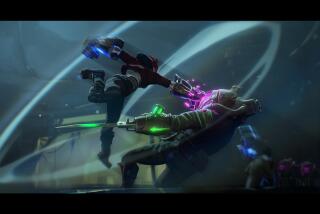‘Rangers’ Have Found Him a Fortune : Television: Producer Haim Saban hopes to spring from the success of the mega-hit children’s show to new ventures in movies, videos, live tours and even theme parks.
- Share via
Under a glass dome in Haim Saban’s office sits a gold-plated Power Rangers toy figure--a symbol of how fortunes can be mined from just one TV show.
Saban is the producer of “Mighty Morphin Power Rangers,” the mega-hit children’s TV show that has spawned the hottest-selling toy in the country and thrust Saban’s small, Burbank-based production company to the forefront of independent Hollywood producers.
“It’s a multibillion-dollar business over the next five years,” says Saban, who hopes to use the success of “Power Rangers” as a springboard to new business opportunities in television, movies, video games, live touring and even theme parks.
Not bad for a man who started out as an Israeli concert promoter, only to go nearly bankrupt after he hired a band of Japanese harpists for a tour that coincided with the Yom Kippur War. Saban later emigrated to France, where he and his partner, Shuki Levy, produced theme songs for TV shows. In 1980, Saban and Levy decamped to Los Angeles and began creating soundtracks for cartoons. From there, they branched into producing low-budget animation.
With “Power Rangers” filling his coffers, Saban is about to embark on his biggest expansion yet by introducing five first-run syndicated shows beginning this spring--a $40-million gamble in a business where flops outnumber hits 10 to 1. But Saban isn’t worried.
“We control all the streams of revenue,” Saban says, gulping water out of an Evian bottle from behind his desk. “The master toy license is one stream, video games is the second, home video another. . . . The ratings are the most visible, but they are just a piece of the puzzle.”
Moreover, “Power Rangers,” Saban predicts, can last 10 to 15 years on the air. “This is a program that will undergo a constant evolution,” he promises. “It’s an unstoppable train.” Although kids can be notoriously fickle viewers, the relatively narrow audience means that as one generation may be growing bored, another is ready to become hooked.
Saban had his first big hit last season on Fox with the animated kids show “X-Men,” which is now in its second season. In recent years, Saban has expanded into made-for-TV movies. Next up: a movie on the Menendez brothers for Fox.
“Everything that has to do with family entertainment we will be in,” Saban says.
Last year, Saban Entertainment had about $70 million in revenue and more than $10 million in pretax profit, up from $43 million in revenue and $8 million in profit two years ago. Saban says he will maintain “steady and significant growth” over the next several years.
Hollywood is littered with small independent production companies that flamed out after one big hit. Saban says he is keenly aware of that and does not intend to join their ranks.
That may be easier said than done. But for now, at least, Saban is riding the wave of success from “Power Rangers,” which has created a bigger stir in the toy world than “Teenage Mutant Ninja Turtles” did a few years earlier.
Although “Power Rangers” recently came under attack for provoking violent behavior in kids, its popularity doesn’t seem to have been threatened. More than 35,000 kids and their parents showed up when the live “Power Rangers” show premiered at the Universal Amphitheatre last month, causing a five-mile traffic jam on the Hollywood Freeway.
“What the (store) buyers think is going to be a month’s supply turns out to be a three-day supply,” says Peter Dang, president of Bandai America, the toy company that holds the master toy license and manufactures the Power Rangers line. He says that more than 2 million Power Rangers toys have been sold so far, generating more than $100 million in retail sales.
Licensing is an important source of revenue for Saban because the money earned from the sale of everything from Power Rangers toys to video games to bedsheets can far outstrip the relatively modest license fees collected from Fox for the rights to air the show.
“ ‘Power Rangers’ is a breakout hit for him that has enormous merchandising capability on a worldwide basis,” says Stanley S. Shuman, managing director of Allen & Co. in New York. “The thing about children’s programming is that it’s universal--toys are toys everywhere--and that’s one of the reasons for Saban’s success.” With a huge influx of cash expected over the next several years, Shuman is advising Saban on options for growth, including financing.
Saban, the Egyptian-born son of a door-to-door office supply salesman whose family moved to Israel after the 1956 war, now employs 150 people at his headquarters in Burbank.
In 1989 the Luxembourg-based broadcaster CLT bought a 25% stake in Saban Entertainment for $16.5 million and in 1990 bought 50% of an animation studio Saban owns in Paris.
With a taste for expensive European clothes and a penchant for publicity, Saban’s high profile occasionally rubs his competitors the wrong way.
Notably in recent years, Saban has bumped heads with rival Andy Heyward, who runs animation producer DIC Entertainment.
Heyward and Saban were close friends and worked together in the 1980s, then fell out and became embroiled in a business lawsuit, which they later settled.
The two have been feuding since. Most recently, Heyward’s DIC tried to launch a new kids’ show called “Power Boy.” When Saban put out a statement that DIC was changing the show’s name because of confusion with “Power Rangers,” DIC retaliated by issuing its own statement that it was changing the name out of deference to a request made by Fox Childrens Network President Margaret Loesch and not due to pressure from any other company.
Friends say some of the friction that exists between Saban and other producers stems from the brutally competitive nature of the syndication business, where a handful of companies vie for a limited number of time slots.
“Saban has a lot of drive and ambition,” says one person who knows him well. “People like that can also be difficult to work with.”
More to Read
The biggest entertainment stories
Get our big stories about Hollywood, film, television, music, arts, culture and more right in your inbox as soon as they publish.
You may occasionally receive promotional content from the Los Angeles Times.










